
This time, we will talk about WASP — a famous manufacturer of construction 3D printers as well as other interesting models. Learn more by reading this article.
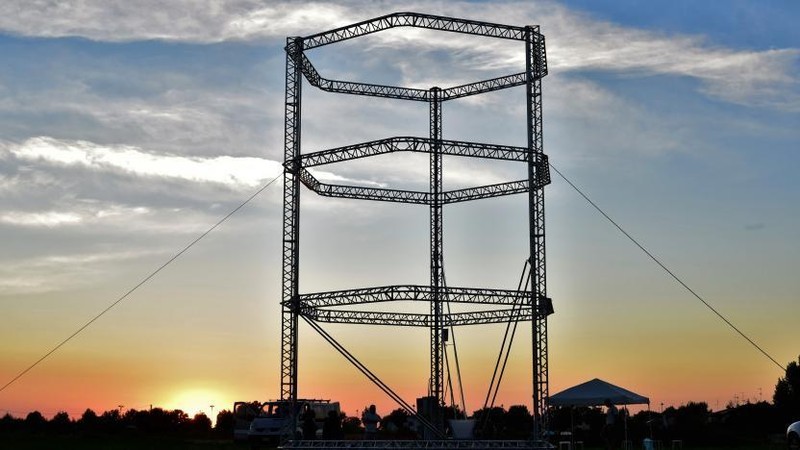
Source: reset.org
The WASP company (World Advanced Saving Project) was founded in 2012 in order to develop effective construction methods based on the principles of a zero-waste economy (with multiple uses of production results). The company sees the construction of the so-called zero-miles houses (houses printed via 3D printers using materials found in the surrounding area) as the key to solving the global demographic crisis, which led to housing problems in many countries. Therefore, the company's research focused on creating a 3D machine capable of printing clay houses in the shortest time and as sustainable as possible.
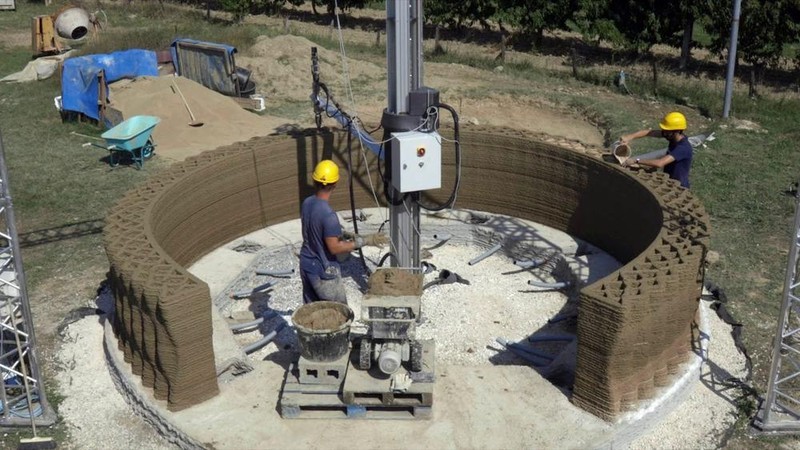
Source: youtube.com
The manufacturer made its debut with the PowerWASP MFP — a 3D printer with the option of engraving and milling — then developed the DeltaWASP line of 3D printers that covered small-, medium-, and large-sized 3D printing.

Source: top3dshop.com
Currently, WASP is developing printers for use in areas such as construction (zero-miles home), art and culture (clay products), medicine (orthopedic products), and food (bi-digital sculptures).
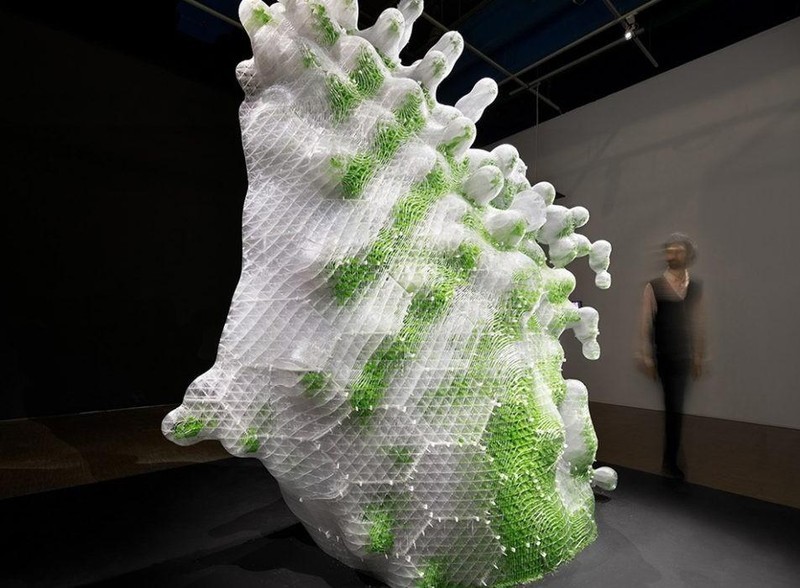
Source: 3dwasp.com
The company invests revenue from the sale of printers in research and development of comprehensive projects aimed at revolutionizing production, namely, the transition to energy-saving, waste-free, sustainable production.

Source: top3dshop.com
This is a powerful and versatile Delta 3D printer, which is perfect for making souvenirs, toys, decor elements. Thanks to the accuracy and speed of printing as well as compactness (it fits perfectly into the office interior), the printer proved itself impressively in the market.
SPECIFICATIONS

Source: top3dshop.com
This model was developed for users who need to print large-sized parts with high accuracy and speed. The printer is equipped with an auto-calibration system and a heated bed (up to 120 °C).
SPECIFICATIONS

Source: top3dshop.com
The model will appeal to those who are fond of ceramics. It is compatible with any ceramic material. Fast and accurate, the printer creates models up to 40 cm high.
SPECIFICATIONS

Source: top3dshop.com
This printer, too, is good for those involved in 3D ceramics. It is capable of printing with any ceramic materials and creates models up to 60 cm high.
SPECIFICATIONS

Source: top3dshop.com
This model is designed for printing industrial facilities. The printer is equipped with double-sided heating and cooling. It is also possible to print in different modes by changing the extruder: available are a single “SPITFIRE EXTRUDER” for fast printing, double “ZEN EXTRUDER” for printing on multiple materials and “FLEX EXTRUDER” for printing on very soft and flexible materials.
SPECIFICATIONS

Source: top3dshop.com
This is a model with an enclosed chamber and an additional cooling system for the casing as well as the function of auto-feed and auto-calibration. It supports printing with pellet raw materials, that is, ABS plastic, which is more convenient and cheaper than filament.
SPECIFICATIONS

Source: 3dprint.com
The device is part of the line of construction printers and allows of printing entire buildings. Despite the small size of the machine, the print area is impressive: one module creates models 6.6 m in diameter and 3 m in height. A huge advantage of this device is portability: the printer can be easily disassembled and moved to another location, ready to print again. The main unit can be assembled in various configurations for convenient printing.
SPECIFICATIONS

Source: top3dshop.com
The design of the printer is collapsible (which contributes to the convenience of its transportation) and modular — it is assembled from elements up to 3 meters in length and allows of printing buildings up to 6 in height.
Motors and electronic components are powered by batteries charged with solar panels. Delta can move the extruder or finished parts; load capacity is up to 200 kg, but to reduce vibrations, recommended is 40–50.
SPECIFICATIONS

Source: 3dwasp.com
At the annual Formnext additive technology exhibition in October 2019, WASP unveiled two new products that will go on sale in the near future.
The Delta WASP 2040 TECH is a printer introducing the new Pellet HD line with a high accuracy extruder. The uniqueness of this device is that, thanks to the high temperature of the stainless steel chamber, it can print in granules. Delta WASP 2040 TECH is the result of WASP research in the medical sector and was created to print implantable prosthetics certified for medical use in the budget segment. The Italian company is developing this process in collaboration with the neurosurgeon William Dallio, who leads the selection of materials and processes in the development of medical 3D printing.

Source: 3dwasp.com
In addition, the company introduced the Delta WASP 3MT CONCRETE. Thanks to WASP's architectural experience, they optimized the existing LDM system with the help of a certified system for 3D printing of large parts with dense materials and continuous feed.

Source: 3dprint.com
The third product is Delta WASP 3MT INDUSTRIAL 4.0, with a continuous feed system and optimized extruder, for 3D printing of fully recycled granular polymers. This model was created for the most advanced solutions in the medical sector as well as plastic processing and the production of furniture elements.
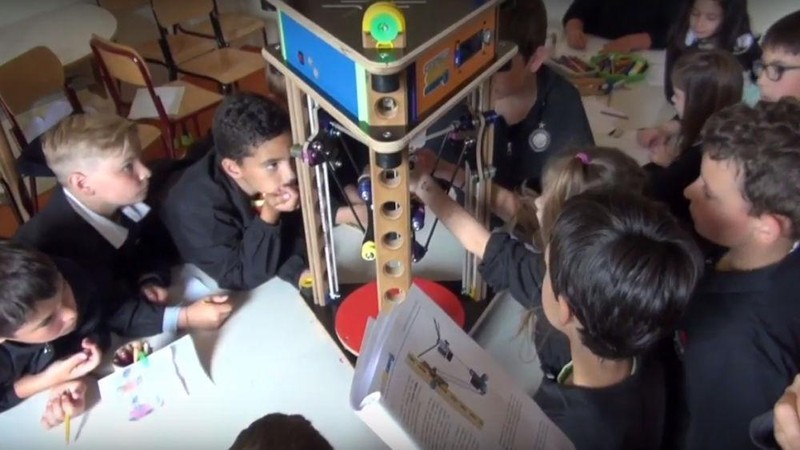
Source: 3dwasp.com
According to the WASP philosophy, the thinking that develops in children as a result of studying theory is different from that which develops in the process of practice. So the company developed a line of printers designed for educational use. This includes the high-performance DeltaCW 1824 in Kit, which is suitable for creating models of relatively large sizes (18 cm and 24 cm in diameter), Delta WASP 2040 EDU (prints models up to 40 cm in height, has a heated bed) and Delta WASP 2040 with Clay Kit (prints clay models up to 40 cm high).

Source: 3dwasp.com
At the Viaggio a Shamballa 3D printing conference and the Call to Save the World conference in 2018, WASP introduced the world's first house printed out of mud with the help of the Crane Wasp printer. Gaia house is part of the project of Shamballa, a sustainable technology village in Italy built using additive technologies.
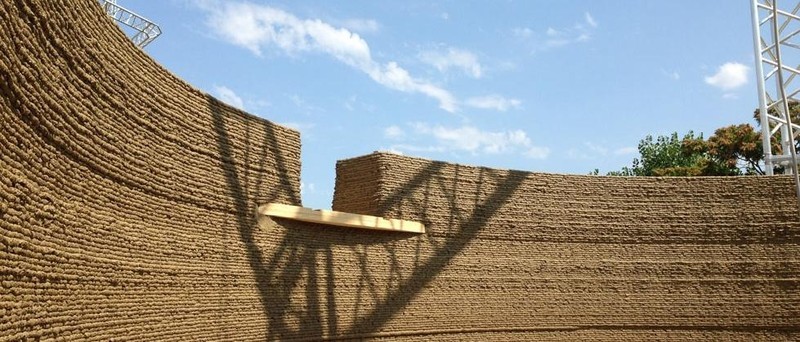
Source: 3dwasp.com
The house was printed in ten days from mud mixture, which consists of 25% of soil from the construction site (sand, clay, sludge), 40% of chopped rice straw, 25% of rice hulls and 10% of hydraulic lime. This composition was used to print walls 40 cm thick, but the roof is made of wood. Concrete printed with the 3D printer was employed for the foundation.
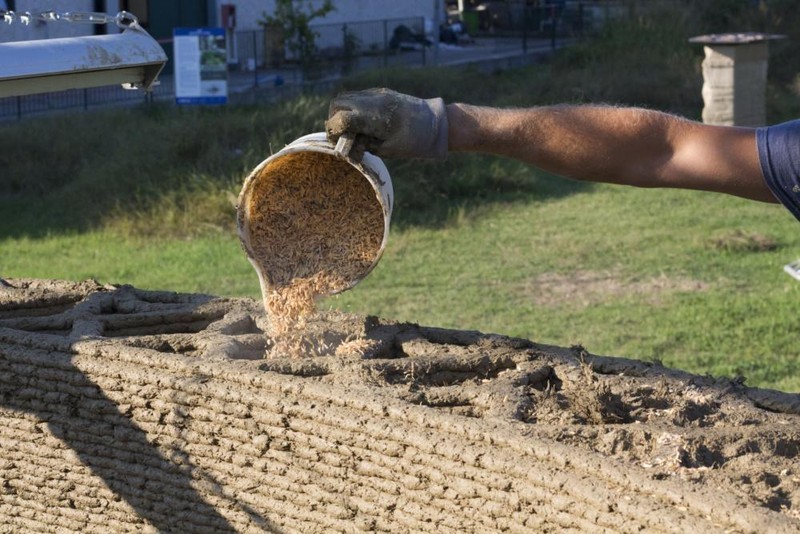
Source: 3dwasp.com
Gaia has windows and a glazed door; the interior is 20 square meters, which looks pretty fine with wood and clay trim. Due to the nature of the masonry, installation of heating and air conditioning systems is not required, since the house maintains a comfortable temperature both in winter and summer.

Source: newatlas.com
The construction and improvement of the house, including the installation of windows, doors, thermoacoustic insulation, fittings, and protective coatings, required only $1035. This amount doesn't include labor costs.

Source: 3dprintingindustry.com
WASP, along with the Italian firm Mario Cucinella Architects, is developing the TACLA project, which embodies the idea of creating a global eco-friendly environment around the world.
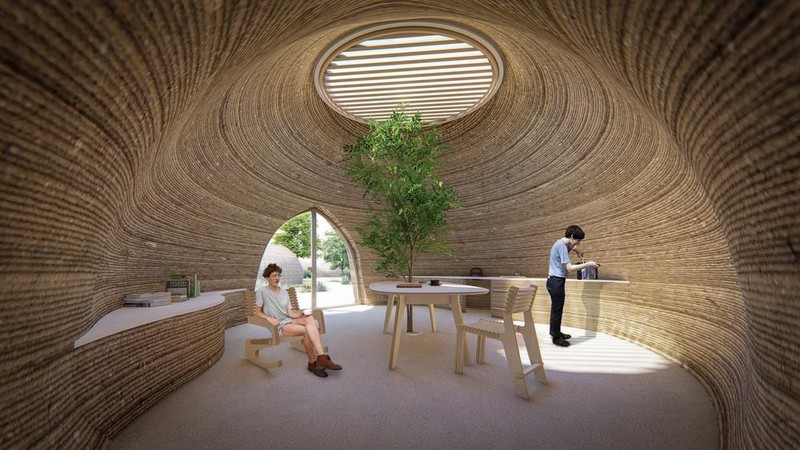
Source: 3dwasp.com
According to the UN report published in 2017, the world's population will grow to 11.2 billion people in 2100, 5 billion of which will live in cities. This creates the problem of total urbanization due to the reduction of agricultural territories. As a solution, WASP proposes to create eco-friendly houses from the resources extracted at the construction site.

Source: 3dprintingindustry.com
The TECLA project is being implemented near Bologna, in Italy. In May 2019, both companies received a building permit, beginning to print in September. To do this, they use the Crane WASP 3D printer, one module of which prints parts 6.60 m in diameter and 3 m in height. The device is also easy to disassemble and assemble, which makes it possible to transport it around the construction site.
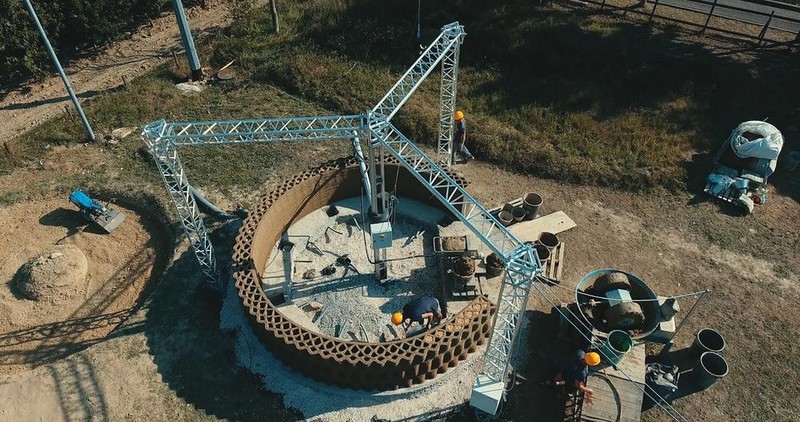
Source: flickr.com
TECLA will be the first house to be fully 3D printed using clay found at the construction site — biodegradable and recyclable. It will help reduce industrial waste and have a positive effect on the national and local economies. In addition, the TECLA house is designed in such a way that it can adapt to different areas and climatic conditions, remaining energy-efficient, and can be quickly built with the help of Crane WASP, unlike traditional houses.
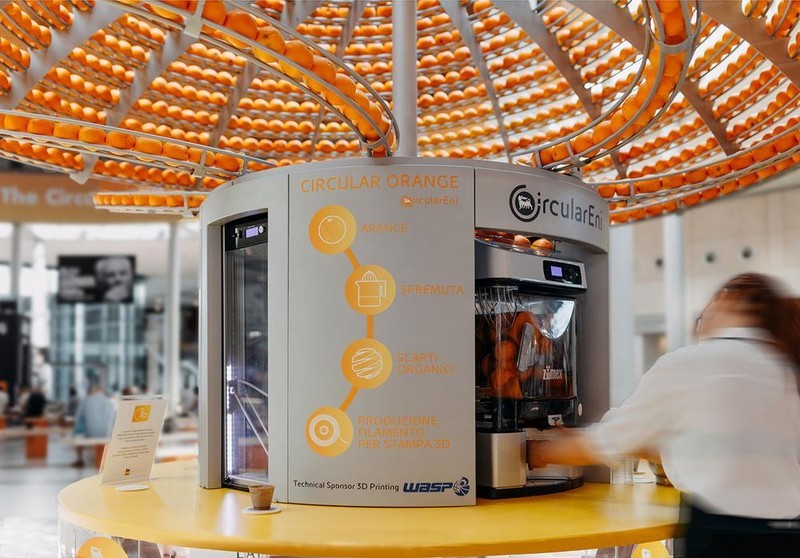
Source: 3dwasp.com
WASP participated as a technical sponsor in the Feel the Peel project: customers can drink orange juice from a cup of orange peel.
Inside the juicer is the Delta WASP 2040 INDUSTRIAL 4.0 3D printer, which prints cups from the peel. Visitors can watch how their cup is printed and then filled with juice.
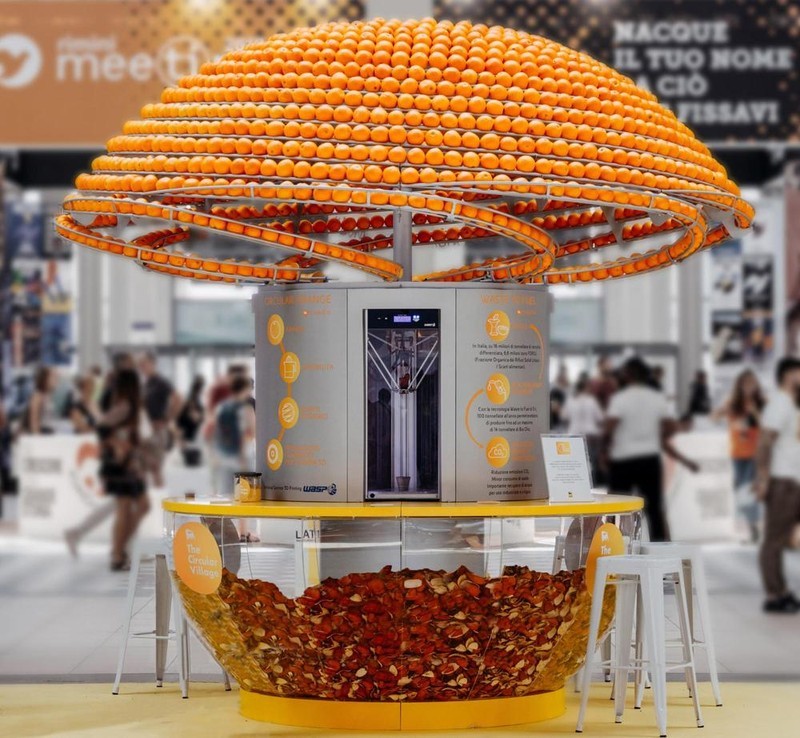
Source: 3dwasp.com
Once you finish your juice, the cup can be recycled. A new one can be made of the crushed peel in order to continue the chain of zero-waste production, be used as raw material to create environmentally friendly bioplastics for other purposes, or as fertilizers for growing new oranges.
“Feel the Peel” is a 3-meter apparatus for automatically squeezing oranges, creating cups from their peel and pouring juice into them.
On top is a dome filled with 1,500 oranges. When someone orders juice, some oranges go to the juicer. Thus, on one side, the machine produces juice, and on the other, the rest of the orange is turned into raw material for cups.
“The principle of circularity can be an inspiration for tomorrow's everyday life objects,” comments Carlo Ratti, the author of the project.
The scope of application of WASP 3D printers is rather wide — from printing souvenirs and study guides to creating cups for juice and building construction.
Whatever your needs are, our experts will help you find the right solution.
Update your browser to view this website correctly. Update my browser now
Write a comment